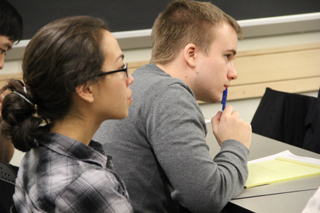In this section, Professor Haynes describes some of the rewards for educators associated with teaching a Kan Seminar.

Students listen as their colleague presents a lecture on rational homotopy. (Photo courtesy of MIT OpenCourseWare.)
One piece of advice I'd like to offer educators who facilitate a course like this is to not worry about the fact that you don't know every detail of every paper. That's not the point of a Kan Seminar. You're not there to teach the material to the students; you're there to help students learn the material. And the way you're going to help them learn the material is not by answering detailed questions about the papers; you're going to help them by giving them general background and a framework for understanding the literature. Your spontaneous responses to the papers will also be very helpful.
Indeed, part of the fun of facilitating a Kan Seminar is that you get to talk about classic papers that you may have read at one point, but about which you've certainly forgotten particular details. You get to live through discovering these details again. It's a great joy to talk about these papers with students who are discovering them for the first time. You really see the development of the field through fresh eyes. It's very exciting. And they always see something different than what you saw. The class never gets stale; it's always fresh. This is a major reward instructors reap when they teach a Kan Seminar.
Another reward is that you get to know students very well. The students in my Kan Seminar are typically first-year or second-year graduate students. So I get to know them well during the seminar and then continue to have that relationship with them as they progress through the program.
